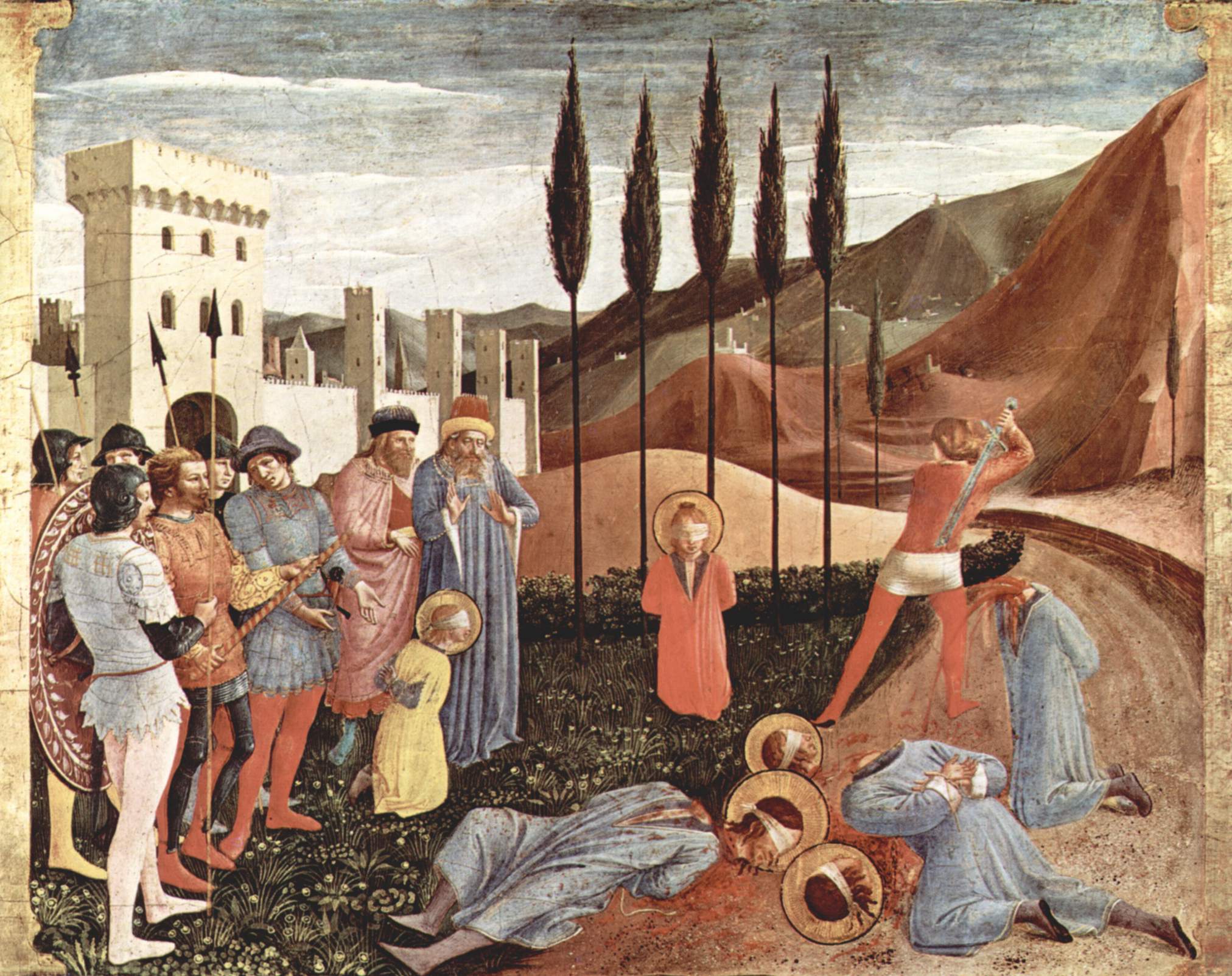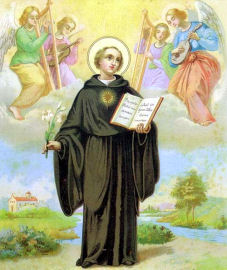
The martyrdom of saints Kosmas and Damian.
Fra Angelico (1395 – 1455)
Posted on 09/09/2014 8:10:16 PM PDT by Salvation
St. Nicholas of Tolentino
Feast Day: September 10
Born: 1245 / Died: 1305
Nicholas was born in Ancona, Italy after his parents had waited a long time for a child. Nicholas was the answer to prayer and a pilgrimage they made to the shrine of St. Nicholas of Bari. His parents were so grateful to the saint that they named their baby after him.
When Nicholas grew up, he wanted to become a priest. He prayed a lot and wanted to live close to God. Friends of his family wanted him to be a priest in a rich parish where Nicholas would be promoted.
Nicholas didn't say anything, but quietly prayed to God for direction. One day he slipped into a church where Father Reginald, a fervent Augustinian priest was giving a sermon. He said: "Don't love the world or the things of this world because this world is passing away."
These words went deep into Nicholas' heart and he realized how God had used that preacher to touch his own life. He knew now the importance of preaching God's Word.
He decided to join the Augustinian Friars when he was just eighteen years old and Father Reginald became his novice master. Then he began his studies for the priesthood and became a priest around 1270.
Father Nicholas spread God's word with love in many parishes. Then while praying in church one day, he seemed to hear a voice saying: "To Tolentino, to Tolentino. Stay there." Soon afterward, he was sent to the town of Tolentino.
He spent the remaining thirty years of his life there. There was great political trouble in those times and many people did not come to church to hear the Word and to worship the Lord.
The friars of St. Augustine decided that street-preaching was necessary. St. Nicholas willingly preached in gathering places where people listened and many repented of their sins and lack of caring and began to lead better lives.
Father Nicholas spent hours in the slum areas of Tolentino. He visited the lonely, brought the sacraments to the sick and dying. He took care of the needs of children and visited prisoners.
Miracles were reported while St. Nicholas was still alive. He touched a diseased child and said, "May the good God make you well," and the child was cured. St. Nicholas of Tolentino was sick for about a year before he died on September 10, 1305.
| Luke | |||
| English: Douay-Rheims | Latin: Vulgata Clementina | Greek NT: Byzantine/Majority Text (2000) | |
| Luke 6 |
|||
| 20. | And he, lifting up his eyes on his disciples, said: Blessed are ye poor, for yours is the kingdom of God. | Et ipse elevatis oculis in discipulis suis, dicebat : Beati pauperes, quia vestrum est regnum Dei. | και αυτος επαρας τους οφθαλμους αυτου εις τους μαθητας αυτου ελεγεν μακαριοι οι πτωχοι οτι υμετερα εστιν η βασιλεια του θεου |
| 21. | Blessed are ye that hunger now: for you shall be filled. Blessed are ye that weep now: for you shall laugh. | Beati qui nunc esuritis, quia saturabimini. Beati qui nunc fletis, quia ridebitis. | μακαριοι οι πεινωντες νυν οτι χορτασθησεσθε μακαριοι οι κλαιοντες νυν οτι γελασετε |
| 22. | Blessed shall you be when men shall hate you, and when they shall separate you, and shall reproach you, and cast out your name as evil, for the Son of man's sake. | Beati eritis cum vos oderint homines, et cum separaverint vos, et exprobraverint, et ejicerint nomen vestrum tamquam malum propter Filium hominis. | μακαριοι εστε οταν μισησωσιν υμας οι ανθρωποι και οταν αφορισωσιν υμας και ονειδισωσιν και εκβαλωσιν το ονομα υμων ως πονηρον ενεκα του υιου του ανθρωπου |
| 23. | Be glad in that day and rejoice; for behold, your reward is great in heaven. For according to these things did their fathers to the prophets. | Gaudete in illa die, et exsultate : ecce enim merces vestra multa est in cælo : secundum hæc enim faciebant prophetis patres eorum. | χαρητε εν εκεινη τη ημερα και σκιρτησατε ιδου γαρ ο μισθος υμων πολυς εν τω ουρανω κατα ταυτα γαρ εποιουν τοις προφηταις οι πατερες αυτων |
| 24. | But woe to you that are rich: for you have your consolation. | Verumtamen væ vobis divitibus, quia habetis consolationem vestram. | πλην ουαι υμιν τοις πλουσιοις οτι απεχετε την παρακλησιν υμων |
| 25. | Woe to you that are filled: for you shall hunger. Woe to you that now laugh: for you shall mourn and weep. | Væ vobis, qui saturati estis : quia esurietis. Væ vobis, qui ridetis nunc : quia lugebitis et flebitis. | ουαι υμιν οι εμπεπλησμενοι οτι πεινασετε ουαι υμιν οι γελωντες νυν οτι πενθησετε και κλαυσετε |
| 26. | Woe to you when men shall bless you: for according to these things did their fathers to the false prophets. | Væ cum benedixerint vobis homines : secundum hæc enim faciebant pseudoprophetis patres eorum. | ουαι οταν καλως υμας ειπωσιν οι ανθρωποι κατα ταυτα γαρ εποιουν τοις ψευδοπροφηταις οι πατερες αυτων |

Wednesday, September 10
Liturgical Color: Green
St. Nicholas of Tolentino, priest, died on
this day in 1305. He received visions
of Purgatory causing him to fast and pray
often for the Holy Souls. Even though
troubled by disease in old age, he
maintained his fasts until his death.

Daily Readings for:September 10, 2014
(Readings on USCCB website)
Collect: O God, by whom we are redeemed and receive adoption, look graciously upon your beloved sons and daughters, that those who believe in Christ may receive true freedom and an everlasting inheritance. Through our Lord Jesus Christ, your Son, who lives and reigns with you in the unity of the Holy Spirit, one God, for ever and ever.
RECIPES
ACTIVITIES
o Elementary Parent Pedagogy: 'Copy Jesus' for Love
o Preschool Parent Pedagogy: How to Tell Stories
PRAYERS
o Ordinary Time, After Pentecost: Table Blessing 1
o Book of Blessings: Blessing of the Sick
LIBRARY
o He Raised 100 Children from the Dead | Lucy Gordan
· Ordinary Time: September 10th
· Wednesday of the Twenty-Third Week of Ordinary Time
Old Calendar: St. Nicholas of Tolentino, confessor; St. Pulcheria (Hist)
St. Nicholas of Tolentino, a native of Sant' Angelo, in the diocese of Fermo, was born about the year 1245. As a young man, but already endowed with a canon's stall, he was one day greatly affected by a sermon preached by a Hermit of St. Augustine and decided to enter this newly-founded Order. At first he lived at the hermitage of Pesaro and then at Tolentino where he died in 1305. His whole life was remarkable for its great austerity which was inspired by his great love of the cross. According to the 1962 Missal of St. John XXIII the Extraordinary Form of the Roman Rite, today is his feast.
Historically today is the feast of St. Pulcheria, daughter of the Byzantine emperor Arcadius (395-408), was coregent and adviser of her brother Theodosius the Younger (408-450). Throughout her life she defended the Faith against various heresies. After giving away her wealth to the poor and to the Church, she died peacefully at the age of fifty-four in the year 453.
St. Nicholas of Tolentino
This Nicholas was born in answer to his mother's prayers. Childless and in middle age, she had made a pilgrimage with her husband to the shrine of St. Nicholas of Bari to ask for a son whom she promised to dedicate to God's service. When her wish was granted, she named the boy Nicholas and he soon gave unusual signs of saintliness. Already at seven he would hide away in a nearby cave and pray there like the hermits whom he had observed in the mountains.
As soon as he was old enough he was received into the Order of Augustinian friars. On account of his kind and gentle manner his superiors entrusted him with the daily feeding of the poor at the monastery gates, but at times he was so free with the friary's provisions that the procurator begged the superior to check his generosity. He was ordained in 1271 and said his first Mass with exceptional fervor; thereafter, whenever he celebrated the holy Mystery he seemed aglow with the fire of his love. His preaching, instructions and work in the confessional brought about numerous conversions, and his many miracles were responsible for more, yet he was careful not to take any credit for these miracles. "Say nothing of this," he would insist, "give thanks to God, not to me. I am only a vessel of clay, a poor sinner."
 He spent the last thirty years of his life in Tolentino, where the Guelfs and the Ghibellines were in constant strife. Nicholas saw only one remedy to the violence: street preaching, and the success of this apostolic work was astounding. "He spoke of the things of heaven," says his biographer St. Antonine. "Sweetly he preached the divine word, and the words that came from his lips fell like flames of fire. Among his hearers could be seen the tears and heard the sighs of people detesting their sins and repenting of their past lives."
He spent the last thirty years of his life in Tolentino, where the Guelfs and the Ghibellines were in constant strife. Nicholas saw only one remedy to the violence: street preaching, and the success of this apostolic work was astounding. "He spoke of the things of heaven," says his biographer St. Antonine. "Sweetly he preached the divine word, and the words that came from his lips fell like flames of fire. Among his hearers could be seen the tears and heard the sighs of people detesting their sins and repenting of their past lives."
During the last years of his life St. Nicholas was bedridden and suffered grievously. He died surrounded by his community. In 1345 a lay Brother cut off the arms of his body intending to take them to Germany as relics, and the friars then hid his body to prevent further attempts of this kind. It has not been found to this day, but the arms have been preserved. It is recorded that they have bled on several occasions, usually, it is said, before some calamity that befell the Church or the world.
Excerpted from A Saint A Day by Berchman's Bittle, O.F.M. Cap.
Patron: Lost souls; mariners; infants; animals; dying people; souls in purgatory.
Symbols: Crucifix and wreath of lilies; flaming star; doves and dish; partridge; fountain; basket with bread rolls; bread; lily; man in black Augustinian habit holding one of the symbols; star above Augustinian; Augustinian with star on breast.
Things to Do:
St. Pulcheria “Thanks to you, the scandals stimulated by the evil spirit were suppressed. Thanks to your efforts, the whole earth today is united in the confession of the same Faith.”
“Thanks to you, the scandals stimulated by the evil spirit were suppressed. Thanks to your efforts, the whole earth today is united in the confession of the same Faith.”
With these words, Pope St. Leo the Great paid tribute to Empress Pulcheria (399-453), grand-daughter of Theodosius. She was baptized by St. John Chrysostom in Constantinople and while still very young, she made a vow of virginity along with her two younger sisters.
Six years after her father, Arcadius, died, the Senate proclaimed her Augusta (empress), and named her regent of her younger brother Theodosius II. Pulcheria was 15 years old when she assumed the full responsibility of government. It is rare in History to find so much prudence joined with such great precocity.
At age 20, Theodosius married Athenais, daughter of a pagan philosopher of Athens. His wife, who received the name Eudoxia when she was baptized, sought to weaken Pulcheria’s influence over the Emperor. Eudoxia ended by persecuting her sister-in-law and favoring the heresy of Nestorius, while St. Pulcheria supported St. Cyril of Alexandria against the heretic. Pulcheria was removed from power and withdrew from the court.
In 441 Eudoxia was exiled because of her infidelity to the Emperor, and Pulcheria returned. Theodosius was supporting the heresy of the monk Eutyches, but Pulcheria convinced him to withdraw it and follow St. Leo the Great.
In 450 Theodosius died. Pulcheria was again proclaimed Empress. One year later the Council of Chalcedon (451) - she assisted at its third session - condemned Monophysism, the heresy of Eutyches. In a letter to the Empress Pulcheria, St. Leo credited her with overcoming the heresies of Nestorius and Euthyches.
On her return from exile, she found the Empire threatened by Attila. She agreed to marry General Marcian to maintain the stability of the Empire on the condition that he respect her vow of virginity. Together they governed the Empire. Marcian persecuted the Nestorians and followers of Eutyches, recalled the Catholic Bishops who had been exiled by Theodosius, and kept Attila outside the boundaries of the Empire. St. Pulcheria died in 453 at age 54.
Excerpted from Tradition in Action
Things to Do:
Day 272 - How strongly obligatory is the truth of the faith? // What does it mean to be truthful?
How strongly obligatory is the truth of the faith?
Every Christian must give testimony to the truth and thereby follow after Christ, who before Pilate said, "For this I was born, and for this I have come into the world, to bear witness to the truth" (Jn 18:37). This can even mean that a Christian lays down his life out of fidelity to the truth and love for God and mankind. This ultimate form of commitment to the truth is called martyrdom.
What does it mean to be truthful?
Truthfulness means that one acts sincerely and speaks honestly. The truthful individual guards against double-dealing, misrepresentation, malicious deception, and hypocrisy. The worst form of untruthfulness is perjury. A great evil in all communities is slander of other people and malicious gossip: A tells B "confidentially" something derogatory that C said about B. (YOUCAT questions 454-455)
Dig Deeper: CCC section (2487) and other references here.
Part 3: Life in Christ (1691 - 2557)
Section 2: The Ten Commandments (2052 - 2557)
Chapter 2: You Shall Love Your Neighbor as Yourself (2196 - 2557)
Article 8: The Eighth Commandment (2464 - 2513)
Jesus said to his disciples: "Love one another even as I have loved you."1 ⇡
You shall not bear false witness against your neighbor.253
It was said to the men of old, "You shall not swear falsely, but shall perform to the Lord what you have sworn."254 ⇡
III. OFFENSES AGAINST TRUTH ⇡
Every offense committed against justice and truth entails the duty of reparation, even if its author has been forgiven. When it is impossible publicly to make reparation for a wrong, it must be made secretly. If someone who has suffered harm cannot be directly compensated, he must be given moral satisfaction in the name of charity. This duty of reparation also concerns offenses against another's reputation. This reparation, moral and sometimes material, must be evaluated in terms of the extent of the damage inflicted. It obliges in conscience.
1.
253.
254.
23rd Week in Ordinary Time
It is a good thing for a person to remain as he is. (1 Corinthians 7:26)
Why is it that the invitation to pray “for vocations” is usually understood to mean pray only for certain vocations—namely, for more priests and religious? Why do Catholics who are single—widowed, divorced, or unmarried—often feel vocationless and in spiritual limbo? Why isn’t Christian marriage more generally seen as a high calling and not just a default option for people who can’t handle a consecrated celibate life?
These are tough questions, but one explanation is that in the early centuries of the Church, there developed a tremendous appreciation for monastic life. This was an inspired, important development. However, it was not complemented by a similar appreciation of Christian marriage and lay life. As a result, passages like today’s reading were often interpreted to mean that consecrated celibacy is the only serious option for people seeking a life centered on God. Even saints like Ambrose saw marriage as a God-given but lesser calling—one in which “we seem to lower and close eyes that were intent on the kingdom of God for a kind of slumber here in the world and are asleep to divine things.”
It’s true that Catholic tradition sees celibacy for the “kingdom of heaven” as a kind of shorter, steeper road toward union with God (Matthew 19:12). Yet as Vatican II affirmed, there is one universal call to holiness, and it addresses “all Christians in any state or walk of life” (On the Church, 40). Each person’s vocation is his or her “particular gift from God,” says St. Paul, and what ultimately matters is how well we obey God in this individual calling (1 Corinthians 7:7, 19).
If you have been called to consecrated celibacy, live the gift! The world needs your witness to the reality of a life beyond this one. If you are married, embrace your call! As you love your spouse and care for your family, you are becoming a hero of the faith. If you are single, know that you are a precious gift, loved by God and commissioned to help build the kingdom. Whoever you are, wherever you are, sink your roots into your calling, and bloom into the holiness God offers you.
“Jesus, I embrace the gift of my present life and circumstances. Help me to value my calling as the path to deeper union with you.”
Psalm 45:11-12, 14-17; Luke 6:20-26
Daily Marriage Tip for September 10, 2014:
“Did not God choose those who are poor in the world to be rich in faith?” (James 2:5) Do you know anyone who is really poor? Look around you. What can you learn of faith from those you see?
| Leap for Joy for Heaven | ||
|
||
|
September 10, 2014. Wednesday of the Twenty-third Week in Ordinary Time
|
||
|
|
||
|
Luke 6: 20-26 Raising his eyes toward his disciples Jesus said: "Blessed are you who are poor, for the kingdom of God is yours. Blessed are you who are now hungry, for you will be satisfied. Blessed are you who are now weeping, for you will laugh. Blessed are you when people hate you, and when they exclude and insult you, and denounce your name as evil on account of the Son of Man. Rejoice and leap for joy on that day! Behold, your reward will be great in heaven. For their ancestors treated the prophets in the same way. But woe to you who are rich, for you have received your consolation. But woe to you who are filled now, for you will be hungry. Woe to you who laugh now, for you will grieve and weep. Woe to you when all speak well of you, for their ancestors treated the false prophets in this way." Introductory Prayer: God the Father, thank you for the gift of creation, including my own life. God the Son, thank you for redeeming me at the price of your own Body and Blood. God the Holy Spirit, thank you for being the sweet guest of my soul, enlightening my mind, strengthening my spirit and kindling the fire of your love in my heart. Petition: Father, help me to seek the things that are above. 1. Because You Say It, Lord… In this passage, I can picture Jesus raising his eyes to look into the faces of his followers. Today, he looks into my eyes and engages my attention with his loving gaze. I accept what he tells me because it is he who speaks. I believe that he has the words of eternal life. Naturally, poverty, hunger, sorrow and being excluded do not appeal to me, but they are the values of my beloved Lord, and that is enough for me. 2. Seek First the Kingdom: Jesus encourages me to strive for the values of his Kingdom, to be forgetful of myself and my well-being. He will take care of me and give me recompense. Heaven awaits me – laughter and joy, a fullness that is unfathomable. It is arduous not to seek “heaven on earth” in riches and pleasure and in fitting in with the crowd. It takes a vision of faith and a spirit of perseverance. 3. Warning Signs: St. Luke transmits to us not only the Beatitudes, but also their opposites. These are like warning signs. If my path is aligned with these opposites, I had better be attentive – where does that road lead me in the long run? Where my heart is, there also is my treasure. Is heavenly, eternal happiness my heart’s desire or are earthly, temporal delights? Conversation with Christ: Lord, give me the joy of experiencing some of the heavenly joy of being united to you here on earth. Help me to find my fulfillment in loving you, in giving my life to you. Resolution: I will examine what motivates me in my daily duty, striving to purify my intention. I will act out of love of God and not out of self-love. By Father Patrick Butler, LC |
September 10, 2014
In the first reading, St. Paul is reminding us that time is short and the world is passing away. So we must not be too concerned about affairs of the world. That is why he recommends a celibate life for those who feel a calling to it – in order to be able to devote one’s full attention to the Lord. We know that St. Paul was single (whether unmarried or a widower is not clear) so he could go on his missionary journeys without being worried about taking care of a wife and kids. He expended all his energy to serving the Lord and God blessed his undertakings.
In the gospel, Jesus is telling us that what the world desires or thinks is important is not important for God. For Jesus, to be poor, hungry, weeping, hated, abused and persecuted are sources of true happiness. How strange this would seem to us! In fact, one cannot explain it unless we look at the lives of Jesus, the prophets and the patriarchs. They all suffered physical deprivation and maltreatment yet we look up to them as examples of holiness and uprightness. The language of the cross is folly for pagans, but for us believers it is the source of our salvation. When we encounter sufferings, we must offer them to the Lord who will turn our sorrow to joy. We suffer in our bodies what is still needed to make up for our sins and the sins of other people. We should be happy if we are deemed worthy of suffering for Christ.
Language: English | Español
All Issues > Volume 30, Issue 5
|
||||||||||||||||||||||||||||||||||||||||

Heavenly Father, in Your love for us, protect against the wickedness of the devil, those helpless little ones to whom You have given the gift of life.
Touch with pity the hearts of those women pregnant in our world today who are not thinking of motherhood.
Help them to see that the child they carry is made in Your image - as well as theirs - made for eternal life.
Dispel their fear and selfishness and give them true womanly hearts to love their babies and give them birth and all the needed care that a mother can give.
We ask this through Jesus Christ, Your Son, Our Lord, Who lives and reigns with You and Holy Spirit, One God, forever and ever.
Amen.
Disclaimer: Opinions posted on Free Republic are those of the individual posters and do not necessarily represent the opinion of Free Republic or its management. All materials posted herein are protected by copyright law and the exemption for fair use of copyrighted works.